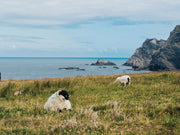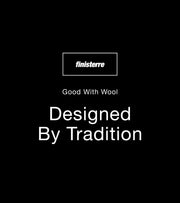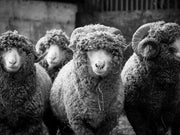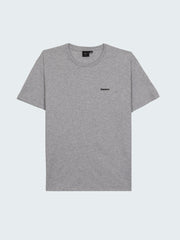
Guide to Wool
From traditional knitwear to technical modern baselayers and fleece ideal for outdoor activity, wool has stood the test of time as one of nature’s most versatile and useful fibres. In this guide, we’ll talk through the amazing natural properties of wool, it’s environmental impact and how to care for your wool garments.


Our Wool
In 2022, wool made up made up 25% of our entire range, 3% of which was recycled. As we build our 2024 collection we’re exploring the use of more recycled wool, from pre-and-post-consumer waste.*
What are the benefits & natural properties of Wool?
Worn by the fishermen and miners who worked the Cornish coast before our arrival, wool has long been known for the range of applications and properties that make it a perfect material for clothing.
- Warm & naturally water-resistant wool knitwear was the smart choice for those early miners & fishermen, keeping them protected in wet and windy conditions.
- Wool has natural thermoregulating properties that keep you warm when it's cold and cool when it's warm – perfect for activewear such as our merino baselayers.
- Highly absorbent and breathable, Wool also quickly wicks moisture away from the body; keeping you comfortable in your baselayer as you push your limits. Wool has natural antibacterial and odour-resistant properties, meaning it stays feeling fresh for longer and needs washing less frequently, saving water.

Where does Wool come from?
We work with wool producers all over the world and pride ourselves on the traceability of the raw materials that go into our products. From our superfine merino growers in Australia, to working with British producers closer to home, the quality of the material is our top priority.
The Impact of Wool
Wool is one of the oldest and most universally used natural fibres. Sheep grow a fresh fleece every year, so when sourced responsibly, wool is a completely renewable fibre and a great choice for producing textiles. And thanks to its unique structure, the tough, water-repellent outer-membrane means when wool is properly cared for, it’s both resilient and durable.
It is well known that wool is an energy-intensive fibre. However, implementing regenerative and organic land management methods can reduce the impact of wool as well as improve biodiversity, water and soil health. The textiles industry is also moving towards conscious alternatives such as recycled and vegan wools, significantly reducing the impact of the fibre without compromising product quality.



How do you wash Wool?
Thanks to its natural antibacterial properties, wool needs far less washing than you might think, and only really needs washing if it's stained or starting to smell. You should always check the washcare label as different wool garments will require different kinds of care. Some wool clothing may require hand washing, but generally speaking you can machine wash most wool garments at low temperatures.
To wash products such as our Merino Baselayers, knitwear or wool fleeces, wash at 30°C and use a gentle wool cycle with no spin, and make sure not to tumble dry. Instead, dry flat and reshape whilst damp for the best results. You should never use bleach to clean wool, and only use a cool iron to finish.
Shop Wool
*Materials used in our 2022 range, based on fabric composition of each style, by volume of product. This includes products already manufactured, and new orders from suppliers for the collection.




































































































































